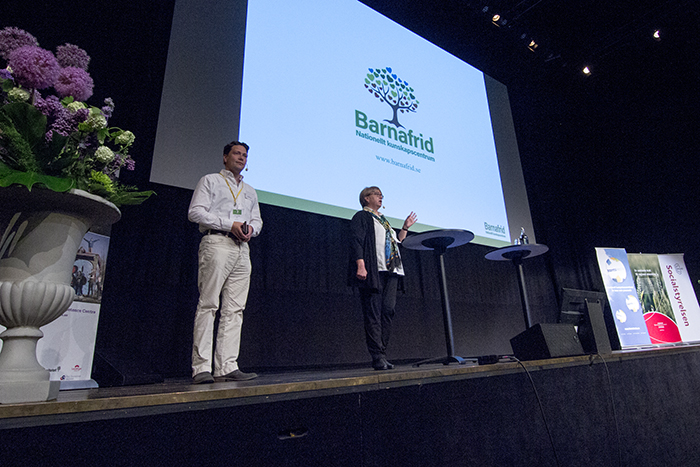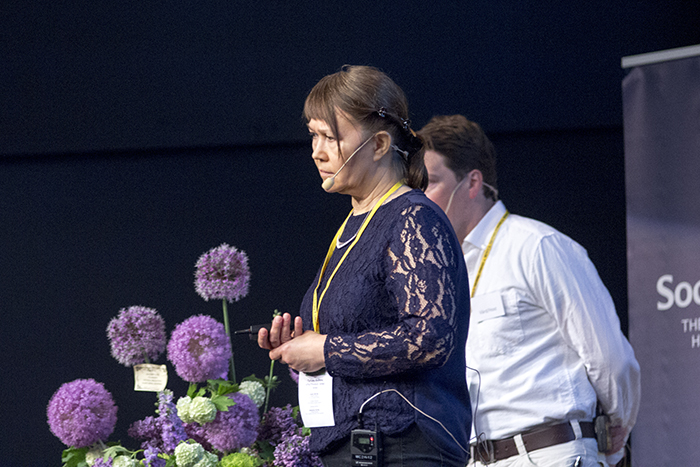”More children’s voices are needed”
With Tatiana Gudkova, Institutt for sosialt arbeid og helsevitenskap, Trondheim, Norway,
Maren Roling. Witten/Herdecke University, Germany,
and Gisela Priebe Dep. of Psychology, Lund university.

Moderator Arvid Karsvall och Gisela Priebe.
It is the third and final day of the international conference "Every Child has the Right to..." in Malmö, and there is a session with the theme Health and Social Care Systems. Some research was presented on young carers in Sweden and children of parents with an intellectual disability.
Tatiana Gudkova from the Institute for Social Work and Health Sciences, Trondheim, Norway was the first researcher to speak. She spoke about children in families where one or both parents have an intellectual disability, something Tatiana Gudkova is researching in her literature review, "Children of parents with intellectual disability: "Transforming" children's lives. Who takes the challenge? Literature Review." The purpose of the overview is to provide systematic knowledge of the research from Canada, Australia, the UK, the USA, Denmark, Sweden, Norway and Iceland about the professional support available to children of parents with intellectual disabilities. Tatiana Gudkova is still working on the literature overview, but claims that the research was limited in this area.
– More children's voices from Norway are needed about this issue, and more research, in order to design assistance for this group, said Tatiana Gudkova.

Tatiana Gudkova
A review
In Germany there are estimated to be 225 000 young carers. Researcher Maren Roling has investigated the experiences of former young carers from their perspective as adults in the literature overview, "Early caregiving and the impact on further life from the perspective as an adult. A literature review."
–The needs of certain age groups make age-specific assistance relevant, said Maren Roling.
The literature review was conducted to provide answers to the following questions:
How did the young carers look back at their care experiences in their family situations?
What impact did their care experiences have on their lives as adults?
The results showed that the young carers felt isolated in their care role, especially if there was no one to talk to. They describe depression, stress and loneliness and associate these with their care role during their youth.
Young carers in Sweden
The final speaker, Gisela Priebe from Lund University, spoke about the pilot study "Young Carers in Sweden" that she is doing together with Ulrika Järkestig Berggren and Ann-Sofie Bergman (both from Linnaeus University) as well as Maria Eriksson from Mälardalen University. The researchers have translated and combined a number of international surveys in an investigation to identify young carers in a Swedish context. Thirty children between the ages of 10 and 17 years old participated in the study. Overall, the children in the study reported that they had less mental well-being and quality of life than children in general. For example, making a comparison with the UK, the Swedish young carers report performing less care, but they report a higher degree of negative consequences and lower psychological well-being. Gisele Priebe gained new insights from the project on what the care itself can be.
–When we started the project I thought we were dealing with providing assistance to the disabled parents, or to the siblings. But some of the children said that is not how it is; my dad has an alcohol problem and I help my mum to get family life to function. So the parent who struggles to keep the family going is the one who gets help. But there are also, of course, examples where the child helps the ill or disabled parent, said Gisela Priebe.
Text and photo: Emil Svensson
Translation: Susan Raia Canali
Senast uppdaterad 2021-12-20 av EmelieS, ansvarig utgivare EmelieS
